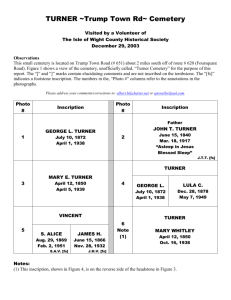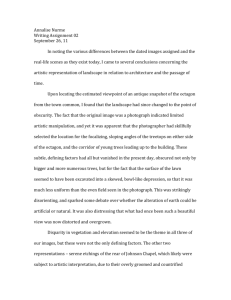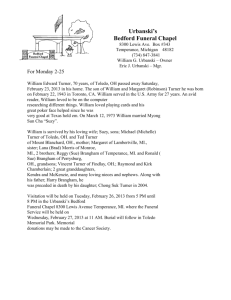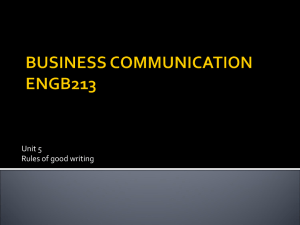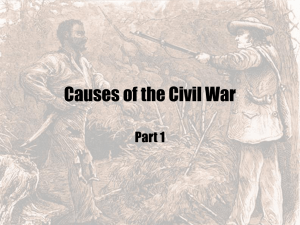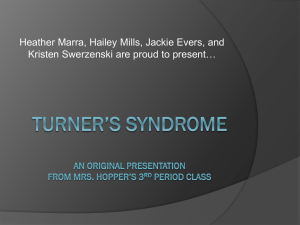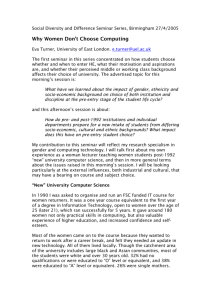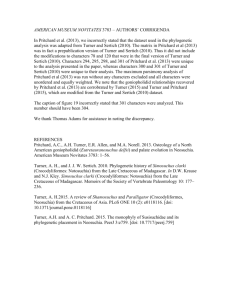CAS 202 COMMUNICATION THEORY
advertisement
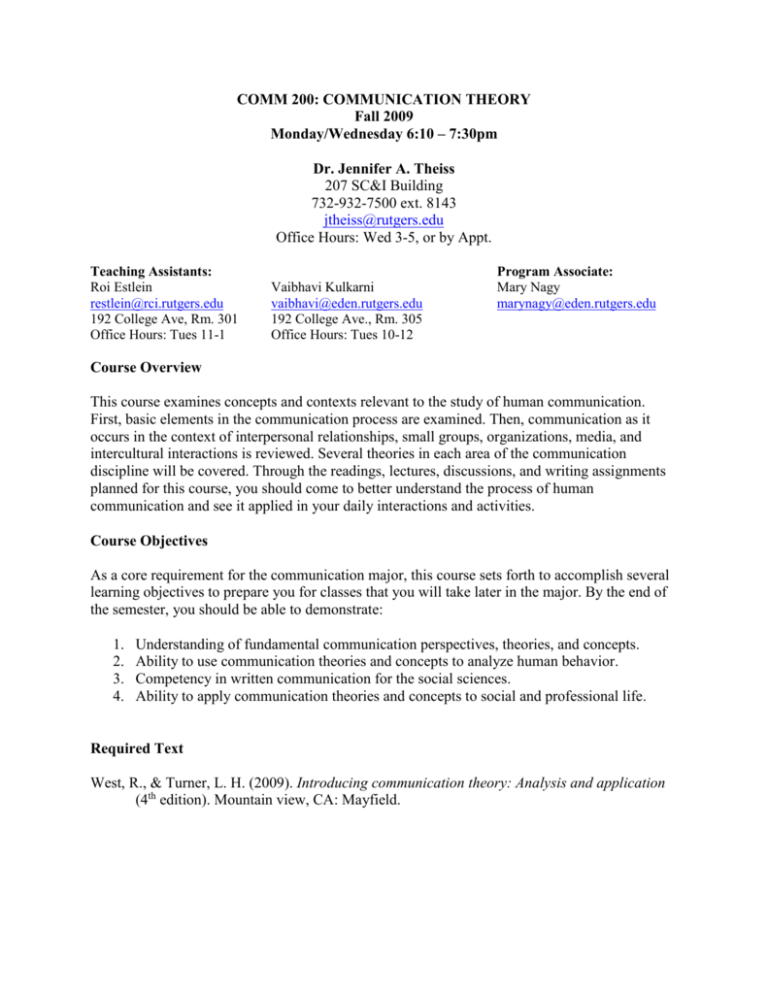
COMM 200: COMMUNICATION THEORY Fall 2009 Monday/Wednesday 6:10 – 7:30pm Dr. Jennifer A. Theiss 207 SC&I Building 732-932-7500 ext. 8143 jtheiss@rutgers.edu Office Hours: Wed 3-5, or by Appt. Teaching Assistants: Roi Estlein restlein@rci.rutgers.edu 192 College Ave, Rm. 301 Office Hours: Tues 11-1 Vaibhavi Kulkarni vaibhavi@eden.rutgers.edu 192 College Ave., Rm. 305 Office Hours: Tues 10-12 Program Associate: Mary Nagy marynagy@eden.rutgers.edu Course Overview This course examines concepts and contexts relevant to the study of human communication. First, basic elements in the communication process are examined. Then, communication as it occurs in the context of interpersonal relationships, small groups, organizations, media, and intercultural interactions is reviewed. Several theories in each area of the communication discipline will be covered. Through the readings, lectures, discussions, and writing assignments planned for this course, you should come to better understand the process of human communication and see it applied in your daily interactions and activities. Course Objectives As a core requirement for the communication major, this course sets forth to accomplish several learning objectives to prepare you for classes that you will take later in the major. By the end of the semester, you should be able to demonstrate: 1. 2. 3. 4. Understanding of fundamental communication perspectives, theories, and concepts. Ability to use communication theories and concepts to analyze human behavior. Competency in written communication for the social sciences. Ability to apply communication theories and concepts to social and professional life. Required Text West, R., & Turner, L. H. (2009). Introducing communication theory: Analysis and application (4th edition). Mountain view, CA: Mayfield. Course Requirements (500 points possible) Clicker Points / Participation: 50 points Your attendance and participation in lecture is crucial to your success in this class. Participation points are earned by using your clicker to respond to questions during lecture. Clicker questions will take two forms. Poll questions are designed to survey the opinions of students in the class, so there are no “correct” answers; therefore, you will earn credit for poll questions just by submitting an answer. Quiz questions are designed to assess comprehension of course material, so you will only get credit for quiz questions if you submit the correct answer. Obviously, you can only earn clicker points when you are present in class. If you are absent or forget your clicker, you will receive a zero for the day. You are allowed to drop your three lowest days of clicker points at the end of the semester. You are NOT allowed to have a classmate click in for you if you are absent. If students are caught using multiple clickers during class, both students will receive a zero for their participation points for the whole semester. In order to receive credit for your “clicks” you will need to register your i>clicker online. To complete the Web registration, go to www.iclicker.com/registration and follow these instructions: 1. Enter your first name and last name. 2. Enter your student ID number. 3. Enter your i>clicker remote ID (found on the back of the remote) 4. Enter the security code that appears on the screen and click submit. After your information is saved on the server, you will see an on-screen message confirming that registration was successful. Your student ID is now tied to your unique i>clicker remote ID. Exams: 300 points Three multiple-choice exams will be given throughout the semester. These are designed to test knowledge and comprehension; therefore, questions will require both recall and application of material. Each exam consists of 50 multiple choice questions and is worth 100 points toward your final grade. All exam dates are listed on the class schedule. The final exam is NOT cumulative. Precis: 75 points (This assignment is detailed in a separate handout) Three one-page papers summarizing and discussing communication theories as reviewed in the West and Turner text are required. Précis are worth 25 points each for a total of 75 points. You may replace your lowest précis score by writing a fourth précis paper and earning a higher score. You may ONLY replace ONE précis score. Précis are due in lecture on the date listed in the syllabus and they will NOT be accepted by email. Late précis papers will not be accepted. Also, no more than ONE précis will be graded for each unit. Theory Critique: 75 points (This assignment is detailed in a separate handout) At the end of the semester, you will be asked to submit a critique of one of the theories that was covered during this course. Your critique will be based on the criteria for evaluating a theory that will be discussed in class and outlined in chapter 4 of the West and Turner text. Final Grade Your final grade will be determined by summing scores on all assignments. Final grades will be assigned according to the following scale: A B+ B C+ C D F (92-100%) = 460-500 points (88-91.9%) = 440-459 points (80-87.9%) = 400-439 points (76-79.9%) = 380-399 points (70-75.9%) = 350-379 points (60-69.9%) = 300-349 points (00-59.9%) = 000-299 points All grades are final. Please do not ask to have your grade changed for reasons other than mathematical error. Applying subjective standards after the fact invalidates the standards applied to the entire class and is unfair to every student. Extra Credit There may be opportunities to earn extra credit in this course by participating in research conducted by faculty or graduate students in the Department of Communication. You may earn up to 15 points toward your final grade by participating in research studies. You will earn 5 points for studies that take approximately one hour to complete and 2.5 points for studies that take approximately 30 minutes to complete. The amount of extra credit you are able to earn in the class will depend on the number of faculty or students who are looking for research participants this semester. You may only earn extra credit for the research opportunities that are presented to the whole class. Good Things to Know: Plagiarism Students sometimes take desperate measures to complete a paper, especially if they feel overwhelmed by the demands of an assignment. Please do not do this. Instances of academic dishonesty will be penalized to the fullest extent in all cases. If you find yourself unable to complete an assignment and considering acts such as plagiarism, please seek help with the assignment from your TA or professor. If you are unfamiliar with what counts as plagiarism, please consult the following website: http://www.indiana.edu/~wts/pamphlets/plagiarism.shtml. Take note, that plagiarism includes more violations than simply turning in someone’s work that’s not your own; it includes “borrowing” phrases from a text without proper citation, stealing another person’s idea and presenting it as your own, and MOST COMMONLY providing unacceptable paraphrasing of text. We strongly encourage you to consult this website so that you are familiar with the rules of plagiarism. Late Assignments All written work is due on the date listed in the syllabus. Precis papers will NOT be accepted if they are late, instead you will have to choose a different unit on which to submit a précis paper. All other assignments will be penalized 10% of the available points for each day that it is late. Papers will NOT be accepted by email. If you are unable to submit your paper during class, you must bring a hard copy of the paper to the SC&I building. The day and time a paper is turned in is defined by when an instructor, TA, or department secretary receives the paper, so you should always be sure to give your paper directly to one of these people. Illness and Other Personal Emergencies If you miss class for illness, or any other reason, you cannot “make up” the clicker points that were missed. There is no difference between an excused absence and an unexcused absence; instead, we simply drop everyone’s three lowest clicker scores to account for unforeseen absences. (If you have any University excused conflicts with class/assignments/exams, such as religious holidays or athletic events, you must notify the TAs in writing by Sept. 14th. After this time, we cannot accommodate any schedule changes.) If you experience an unavoidable personal situation that prevents you from completing work on time, you must take responsibility for informing your instructor prior to the date the work is due. A failure to contact your instructor prior to the due date will result in the application of the late assignment policy described above. Extensions will ONLY be granted for substantiated and documented emergencies. Make-up exams are scheduled ONLY in cases of documented and unavoidable conflicts. You must notify your instructor prior to the exam date to re-schedule. Please be advised: It has been my experience that the Rutgers student medical center and some private practices are happy to write a note excusing students for virtually any visit to their office, regardless of the severity of the illness; therefore, I do not accept doctors’ notes as justification for late assignments or missed exams. Access Rutgers University encourages qualified persons with disabilities to participate in its programs and activities. If a student enrolled in this course anticipates needing any type of accommodation or has questions about physical access, please notify the instructor as soon as possible. We Are Here to Help You The Comm 200 team wants to help you reach your goals in this course. If you have questions or concerns, start by contacting your teaching assistants. They have most of the answers for everything, or they can ask me for the answers they don’t have. Take advantage of scheduled office hours held by the professor and teaching assistants to get help when you need it. Office hours end on the last day of class, they will not be held during finals week or beyond the end of the semester. Dates Topic Readings & Assignments___ STUDYING COMMUNICATION THEORY 9/2 Introductions & Course Overview 9/8 Defining Communication West & Turner Ch 1 ***This is a TUESDAY that will follow a Monday class schedule*** 9/9 Communication Theory West & Turner Ch 3 BASIC ELEMENTS IN COMMUNICATION 9/14 Verbal Messages Coordinated Management of Meaning West & Turner Ch 6 9/16 Nonverbal Messages Expectancy Violations Theory West & Turner Ch 8 9/21 Information Processing Symbolic Interaction Theory West & Turner Ch 5 Precis #1 due on Ch 5, 6 or 8 INTERPERSONAL COMMUNICATION 9/23 Forming Relationships Uncertainty Reduction Theory West & Turner Ch 9 9/28 Relationship Development Social Penetration Theory West & Turner Ch 10 9/30 Communicating in Intimate Relationships Social Exchange Theory West & Turner Ch 11 10/5 Relational Dialectics Theory West & Turner Ch 12 10/7 Conflict Management Precis #2 due on Ch 9 - 12 10/12 EXAM 1 SMALL GROUP & ORGANIZATIONAL COMMUNICATION 10/14 Small Group Decision Making Groupthink West & Turner Ch 14 10/19 Influence in Groups Adaptive Structuration Theory West & Turner Ch 15 10/21 Leadership in Groups 10/26 Characteristics of Organizations Organizational Culture Theory West & Turner Ch 16 10/28 Organizations as Networks Organizational Information Theory West & Turner Ch 17 Precis #3 due on Ch 14 - 17 PUBLIC COMMUNICATION 11/2 Characteristics of Public Address 11/4 Rhetoric West & Turner Ch 18 11/9 Rhetorical Criticism Dramatism Narrative Paradigm West & Turner Ch 19 & 20 Precis #4 due on Ch 18, 19, 20 11/11 EXAM 2 MEDIATED COMMUNICATION 11/16 Characteristics of Mediated Communication Uses & Gratifications Theory West & Turner Ch 23 11/18 Media Effects Cultivation Theory Spiral of Silence Theory West & Turner Ch 22 & 24 11/23 Media and Society Media Ecology Theory West & Turner Ch 25 Precis #5 due on Ch 22 – 25 11/25 NO CLASS – THANKSGIVING BREAK INTERCULTURAL COMMUNICATION 11/30 Facets of Culture Face Negotiation Theory West & Turner Ch 26 12/2 Cross-Cultural Communication Standpoint Theory Communication Accommodation Theory West & Turner Ch 27 & 29 12/7 Gender as Cultural Identity Muted Group Theory West & Turner Ch 28 Precis #6 due on Ch 26-28 12/9 Course Summary Assimilation Paper Due **Exam 3 (covering material from 11/16-12/9) will be held Wednesday, December 16 from 8pm – 11pm.
